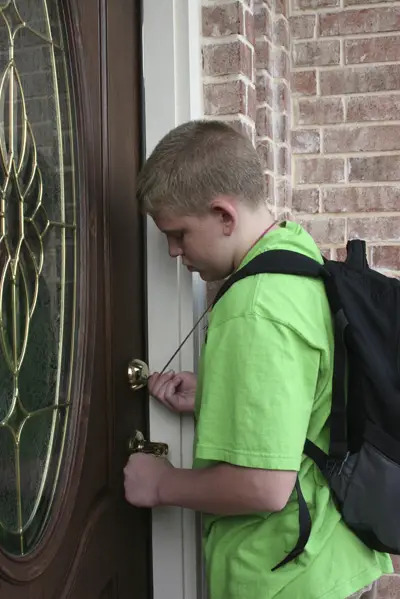If you are considering leaving your child at home alone for a few hours before or after school, while you are at work or just out running errands – you are not alone.
Thousands of parents each year are faced with the task of deciding if their child is ready, willing and capable of being at home unsupervised. But is your child ready? Are you?

The decision to leave one or several kids at home alone is a serious one that needs to be discussed with everyone — including the kids.
Even though your kids are getting older, and are begging for more independence, it’s you, the parent, who must be the one who decides if they are ready.
School-aged kids are being left at home alone now more than ever before. Many parents feel that they have few alternatives because of demanding work schedules, lack of alternate child care options, strained finances, or even by request and persistence of the kids themselves.
But before you give into their demands, you need to consider the legal, practical and moral issues that are involved when you leave a child unsupervised.
Is it legal to leave your child at home alone? Is your house and neighborhood safe? Do your kids want to be home alone?
There are several laws across the country that address when it is legal and safe to leave children unsupervised. Most do not have specific ages, but rather a set of circumstances that need to be met. For example, if a 12-year-old child is left at home alone for long periods of time, and is likely to be in danger, then they could be apprehended by the authorities as a child in need of protection.
On the other hand, if a 12-year-old child was left at home alone for a short duration, in a safe home with an adult close by and is not likely to be in danger, then he would be permitted to be alone.
Age is not the only determining factor. Maturity, circumstance, environment and duration are all factors
In testing kids’ readiness, begin by testing their reactions, by role-playing realistic scenarios and making your expectations very clear.
Start with identifying possible realistic scenarios that they may encounter while at home alone. If you are happy with their responses, start talking about what being at home alone will mean to them.
Decide what times they will be alone. Will it be before or after school, or for a couple of hours while you run errands? Stick to it. Don’t leave them at home, alone, longer than agreed upon.
Allow your children to be part of the decision to stay at home alone, and always leave them with contact information of another adult they can reach in the case of an emergency. Talk about their feelings; find out what they fear and what worries them when they are alone.
Start with short 10-15 minute time frames. After each separation, talk about it. If the first few short tests are successful, and your child feels confident he can handle a longer duration, you can start to add more time.
If your work schedule calls for you to be away for several hours, be sure to plan for quality child care until you are both ready for longer periods at home alone.
Whether your child should be at home alone is a decision that needs to be made by both you and your kids. If, after assessing your situation and talking with them, you don’t feel that either one of you is ready, wait. At some point, you will be.
A former police officer, SAMANTHA WILSON is now founder and president of Kidproof, where she writes, gives courses and advocates for child safety. www.kidproofusa.com.






















